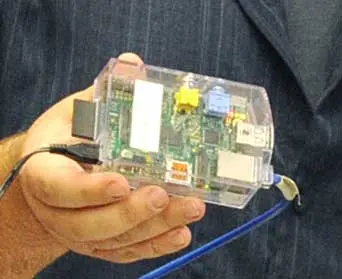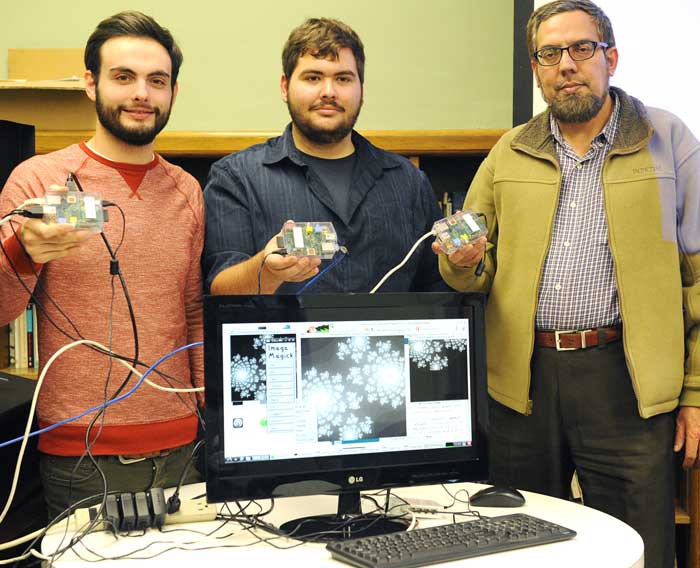

Accepted Students ONLY!
Join us Saturday, March 28 (10 AM–2 PM) for Go Big BLUE DAY — sessions, tours, and giveaways.
Sign Up Today!


 Adam Toth and Nicholas Freville join Computer Science Professor Junaid Zubairi in displaying the three Raspberry Pi’s that comprise the Beowulf cluster the two students assembled for a class project. |
Computer Science majors Nicholas Freville and Adam Toth have assembled a Beowulf cluster, comprised of three tiny computers called Raspberry Pi’s, that work in tandem to solve complex problems.
With 512 MB of memory, each computer – about the size of a credit card and encased in a hard plastic case -- is as powerful as a smart phone, Toth explained. There is no keyboard, but these devices can perform a variety of functions when hooked up to a monitor and keyboard.
A Beowulf cluster is a parallel computing system achieved by linking normally identical, commodity-grade computers into a small local area network (LAN). The result gives a huge boost of power despite using inexpensive, personal computer hardware.
“These computers are not high-performance machines, but when clustered together, their performance is boosted,” explained Computer Science Professor Junaid Zubairi, who supervised the class project undertaken by Toth and Freville.
A Beowulf cluster achieves high performance by dividing the workload to several small computers that work in parallel and delivers the results to a master controller that integrates and presents the results to the user interface. Freville and Toth used three Raspberry Pi’s for their project.
“How I view the cluster is comparing it to group projects for a school class. You have equal students (nodes), and one of the students is elected the leader (master node). Each student is given a copy of the homework (program) but is never told when to begin working on it,” Freville explained.
“When told to do so the group leader will send a message to each member of the group telling them to start working and which parts they should do. After completing the work all of the data is sent to the group leader to be turned in. Communication is very important with a cluster because if one node is off, the entire system is off,” Freville said.
A Beowulf cluster derives its name from the poem “Beowulf,” in which it is said Beowulf has “thirty men’s heft of grasp in the gripe of his hand.” Freville and Toth interpret that line as having the power of 30 men, or computers, controlled with his hand, or the master computer that gives out instruction.
“We really wanted to work with the Pi’s because it was a great opportunity to work with the Linux operating system,” Toth said. It was the first time both students worked with cluster computing.
“We read about it on several occasions, but never worked first hand with it. This was one of the first times that we were able to record and visualize the time it takes to send information to individual computers with the graphs we constructed,” Toth explained during a Dec. 5 demonstration.
The first program run on the system calculated the value of pi, which was ironic on the Raspberry Pi, Freville noted. “That showed that the system worked and gave a good idea of the delay caused by the network only.”
Toth, who plans to seek a job with a private software developer or government after graduating in May, said the finished product can be utilized as a great teaching tool, depicting how to run a program across multiple computers.
“Using Linux is something that I have never delved into a great deal, but this project allowed me to see how powerful it is concerning Raspberry Pi's,” said Freville, a junior, who would like to work in the robotics field or game industry. This project will assist him when working with systems that have restricted memory and RAM.